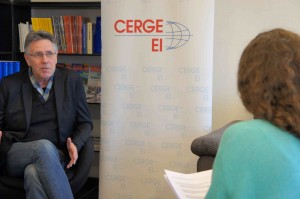Dr. Martí Mestieri (Toulouse School of Economics) researches the dynamics of new technology adoption in developing countries in order to explore the patterns of convergence and divergence between rich and poor countries. The models he uses show that changes in the pattern of technology diffusion account for at least two thirds of the Great Income Divergence between rich and poor countries since 1800. During his visit to CERGE-EI in December, we sat down with him for a brief chat.
Tell us about the paper you are presenting at CERGE-EI
Before the industrial revolution, the income disparity between countries was not that high. The richest country was maybe twice as rich as the poorest. Now there are much great magnitudes of difference between rich and poor countries. With the industrial revolution, growth has become very uneven. Some countries have experienced sustained growth while others have stagnated. Economists of course have been puzzling with this question for a very long time.
What we do in this project is we try to isolate the channel of technology adoption. Even though there are methods of production that make labor much more productive, it seems that many countries are not adopting the best technologies that are out there. So we collect data for many technologies and many countries and we are trying to understand how much technology adoption (or lack thereof) explains the differences between growth performances in the last 200 years.
This is what they call the ‘Great Divergence’, right?
Exactly. Especially in the 19th century you observed a handful of western countries starting to take off, while others didn’t grow at all. So over 100 years, you develop a huge gap in income per capita.
So how much does this technology adoption channel explain differences?
I wouldn’t say ‘explain’, I would say ‘account’, because we don’t have a fundamental theory for why these differences in technology adoption exist. But we find it accounts for a lot, almost 70%. Indeed the question that lies ahead is what are the drivers of technology adoption. In order to explain this, you have to confront a couple of facts. The first is that adoption lags have been declining over time—poor countries are adopting new technologies relatively faster over time. This means the poor countries are relatively more productive because they are catching up.
But what we find as well is that the rate at which technology diffuses within poor countries is actually slower. So even though they are importing technology faster, they are not diffusing it well within their borders. I think this is a set of interesting facts, and if you want to have a big theory, you need to have a theory that predicts these two things, and this is not entirely obvious.
Can you try to explain some reasons why?
This is the most interesting question, and the one we are after. But just building a consistent methodology to assess differences in technology adoption has been keeping us busy. We have some theories that we are exploring. One idea is that some of the early technologies that were produced in the industrial revolution are important inputs for future technology. We see that emerging economies have been lagging behind because they lack this ‘infrastructure technology.’ We think that the diffusion of new technologies is actually being prevented in these emerging economies because perhaps they don’t have the stock of old technology infrastructure necessary for the new technology. So these lack of old technologies are a bottleneck for the new technologies to diffuse.
Another idea is that income inequality may play a role. This means that new technologies are only adopted by a small and elite fraction of the population, and this fraction is not enough to generate spillover to the wider public. But these are only partial explanations. To get more depth, we have to dig much deeper.
Interviewer: Liyousew G. Borga
7 December 2012


 You are interested in experimental and behavioral economics. Why did you choose this field and who influenced your decision?
You are interested in experimental and behavioral economics. Why did you choose this field and who influenced your decision?